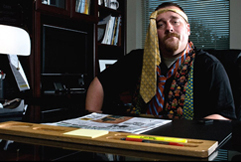“The Psychological Portrait of a Professional” or “Don’t let people prove to you that you are only a professional”
 Let’s say…you’re a professional. It doesn’t matter what you’re good at. But no one knows you. Yet. Yet. And if you sit idly by – no one will know about you, your professionalism will be lost, you will be interrupted by other more effective competitors, your self-esteem will fall… That means that you have to choose the way of moving to fame and professional popularity, to prove your professional suitability.
Let’s say…you’re a professional. It doesn’t matter what you’re good at. But no one knows you. Yet. Yet. And if you sit idly by – no one will know about you, your professionalism will be lost, you will be interrupted by other more effective competitors, your self-esteem will fall… That means that you have to choose the way of moving to fame and professional popularity, to prove your professional suitability.
Such a path, namely the path to the designated peak of success – always accompanied by footsteps, lack of support and creative ideas, and even vague prospects for such endeavors. Many people in the process of movement – step on the hands of other, already fallen “ex-professionals” (note, who went off the track – stereotypically considered a weakling, although – it is just a person “not a fighter” for his professionalism), others, on the contrary, carefully circumvent any “obstacles” – spending on this process of time and money. But it is considered that all this is nothing if you – a real and practical professional, because before professionalism is hard enough to put a more worthy alternative than … professionalism. And professionalism, as an antique – always in price.
I will not go into the details of the concept of “professionalism”, as it is quite a collective concept on the one hand and, in turn, quite specific on the other. In order to study the psychological side of the issue, let’s limit ourselves to the wording: “a professional is a person who knows his/her business well, has education, experience and practice in a particular area of activity”, i.e. professionalism is a category of evaluation of skills and abilities of an individual person. Therefore, let us take this definition as a fact, as a given in this article.

… “He understood me right away! He understood exactly what I needed!” – shouted Tolya at the top of his voice to his wife Alexandra. “Yes, he understood – and took from you an advance payment for something that costs four times as much – and in fact, no different from the usual!” – Alexandra replied.
“He’s a professional, and you don’t understand anything!” – Tolya didn’t stop justifying himself, clinging to everything that came into his head, since the purchase was non-refundable as well as the prepayment. “Yes, he is a professional, only not in production – but in its sales!” – Alexandra finally and irrevocably finished her husband.
People tend to perceive mutually displacing things in communication, like delving into specifics or particulars, the same details – as professionalism. They confuse “presentation skills” with “direct knowledge”.
Psychological profile
 A classic pro is substantive, constructive and highlights the main points from the mass of information. In other words – he is able to make a paragraph out of 5 pages – which will be key, defining and decisive.
A classic pro is substantive, constructive and highlights the main points from the mass of information. In other words – he is able to make a paragraph out of 5 pages – which will be key, defining and decisive.
As a rule, he thinks in a system in which important places are occupied by both major and minor components, which skillfully complement each other in practice. After all, a pro is a practitioner, not a theorist, otherwise he is not a pro – but a prepad.
“…The main thing is quality. That’s why he’s a professional. He’s just unlucky at times…” – said Vitaly, having received for the third time a re-recorded recording of his favorite song, which was simply ruined the previous times due to the fault of the sound director.
Professionals are statistically (Center for the Study of Personality by 2008) more likely to be discounted by people. Why? Because they “press authority” like a tank. That means there are no alternatives to him, and that means he is beyond competition.
And what about quality?
Psychological profile
 The issue of the quality of the pro’s work – should be a priority. But it “should”, but it does not always happen. The reasons for this are not knowledge, practice and skills, but inattention, as well as a number of individual psychological and physical characteristics of a professional – preventing him from realizing his professionalism (age, mood swings, altered states of consciousness, bad habits, in general – the “human factor”).
The issue of the quality of the pro’s work – should be a priority. But it “should”, but it does not always happen. The reasons for this are not knowledge, practice and skills, but inattention, as well as a number of individual psychological and physical characteristics of a professional – preventing him from realizing his professionalism (age, mood swings, altered states of consciousness, bad habits, in general – the “human factor”).
Inattentive professionals are people who are either quick-thinkers (overshooting and missing), lazy (lacking drive, motivation, desire), or overworked/overloaded with activity.
Inattention can be a temporary indicator, or it can be a permanent trait or even a character trait. In the case of temporary inattention, it is normal (accepted as the norm), but in the case of permanent inattention, it is not a professional.
“Who? Arkady? No way! This man can fix cars, but it’s not a mechanic’s job to organize a car repair company!”
Psychological profile
 A professional and an organizer are different concepts. A professional may be an excellent expert in the depth of his/her issue, but it may be an impossible layer for him/her to dock and check many aspects of the structure’s activity.
A professional and an organizer are different concepts. A professional may be an excellent expert in the depth of his/her issue, but it may be an impossible layer for him/her to dock and check many aspects of the structure’s activity.
A pro is a person with a narrow profile, high concentration and direct facts of application.
Here he is a pro – there he is a profane. This is normal. For everyone should do his own thing.
“Wide profile pro” is more of an intellectual extrovert and more of a politician by nature and positioning, rather than just a professional. Broad profile is a stretch, most often meaning “everything is nothing”. And “nothing” is irrelevant to the topic of professionalism.
“What’s he got to fix it? He’s a pro!” – shouts wet Vasily Petrovich from the window, holding in one hand a pipe (which, not so long ago, apparently, supplied his bathroom with hot water…) and in the other a wrench, clearly not intended for emergency elimination of such accidents.
Psychological profile
“The pros – everything comes easy,” say outside observers. But no. After all, professionalism is in this, when from the outside it seems that everything comes easy to you – but in fact, behind it lies a lot of hard work (and not only on professional tasks, but also on yourself). But the sign of professionalism is that it still seems to everyone that you do it easily. In this regard, people clearly respect the pro, but devalue the cost of his efforts, time, attention to perform his work (requiring his direct intervention) in comparison with their own cost.
 An important quality of a professional is to maintain the quality of his knowledge and skills at the level, i.e. constant training and constant practice as obligatory components of his activity. If a professional believes that he works “better – nowhere better”, it is not a professional, but a shallow person who will soon lose his position in the market of professionals, i.e. among his clients and partners. A true pro – understands the importance of maintaining his professional tone in “combat readiness”.
An important quality of a professional is to maintain the quality of his knowledge and skills at the level, i.e. constant training and constant practice as obligatory components of his activity. If a professional believes that he works “better – nowhere better”, it is not a professional, but a shallow person who will soon lose his position in the market of professionals, i.e. among his clients and partners. A true pro – understands the importance of maintaining his professional tone in “combat readiness”.
“Aha…. So him, then someone else and so 20 people you suggest I recruit to the company. I’m so broke! And what kind of groups can there be? A place for everyone… A professional should work on his own!”
Psychological profile
 A pro can work both independently and in a group (depending on his individual characteristics), and in a group of both professionals and non-professionals in general; both to lead and to obey. He finds his place and successfully overlaps the assigned area in terms of high level of work performance. Thus, the basis of his activity is the result of the highest quality.
A pro can work both independently and in a group (depending on his individual characteristics), and in a group of both professionals and non-professionals in general; both to lead and to obey. He finds his place and successfully overlaps the assigned area in terms of high level of work performance. Thus, the basis of his activity is the result of the highest quality.
Above, we talked about personal qualities – hindering pros. These are inattention, individual characteristics of the pro. These issues are easily eliminated by the work of a pro in a group. Since to check the work of a pro on the same orthographic component is not superfluous, as there is always something to correct….
“He didn’t say a word. He didn’t prove himself! What can he do?”
Why, then, is there an opinion that a professional, in order to become famous, must prove his professionalism, which means that he will have to argue, defend and even fight? And if this does not happen, then that’s it, he is not a professional. But why?
Psychological profile

Defending, fighting – these are questions to the individual peculiarities of a person’s character, and has nothing to do with his level of ability to do his job – has nothing to do with it. Yes, a pro is not a fighter, because he is a pro. But, if the pro is a fighter – it can speed up the climb up the ladder of success and recognition (or move the pro into the category of PR…). In any case, the “ability to defend” one’s skills is a useful and necessary quality, but from the point of view of defining professionalism it is not necessary.
In some form, active pursuit still becomes a competitive battle with victory or defeat in the same direction. Tools, techniques and team are chosen and actively participate in such a necessary process of self-assertion as – “declaration of your professionalism to the society”… The task is to hold the market, to choose the right form of notification about entering this society and to prove yourself… I.e. the task is not easy.
But really, the question of applying one’s professionalism is only in the adequate correspondence of individual demands (your wishes), professional opportunities (your skills) and working conditions (practical conditions of labor and its provision) for each pro. If there is harmony – it can be considered that you have successfully self-realized as a professional. After all, the mere fact of being famous is not a sign of professionalism, although it is a weighty labor.
 But time passes, the path from a novice professional to a famous one is almost finished… You have overcome it and now you are one of the chosen, honored and popular. The goal is already – here it is, you can feel it with your hands, but… key, after the evaluation of you as a Professional, after the recognition of you as a real Expert in your profile issues, you get the second evaluation… of your human qualities. And it is, in fact, much more important than the first one, to which you moved falling and rising, bumping yourself and changing/breaking yourself, applying images/masks/styles and forecasts on the perception of your professionalism.
But time passes, the path from a novice professional to a famous one is almost finished… You have overcome it and now you are one of the chosen, honored and popular. The goal is already – here it is, you can feel it with your hands, but… key, after the evaluation of you as a Professional, after the recognition of you as a real Expert in your profile issues, you get the second evaluation… of your human qualities. And it is, in fact, much more important than the first one, to which you moved falling and rising, bumping yourself and changing/breaking yourself, applying images/masks/styles and forecasts on the perception of your professionalism.
The evaluation by others of your human qualities, which accompany your professionalism throughout the whole way to its “presentation” to society – your business card to new people and connections, prospects, i.e. your image. For these are the stories: how exactly you went, whose hands and necks you stepped on along the way, as well as analyzing whether it was necessary… ?
The dilemma is what you’ve proven. But what exactly? Have you proven who you are in your nature or your professionalism? And to whom? To them or to yourself? Winners, as it is known, are not judged, but is it important for you, from the point of view of human relations, to know that people around you say: “He is a hundred percent pro, but the man is a crap…”.
Anisimova Alisa
Psychologist – physiognomist














